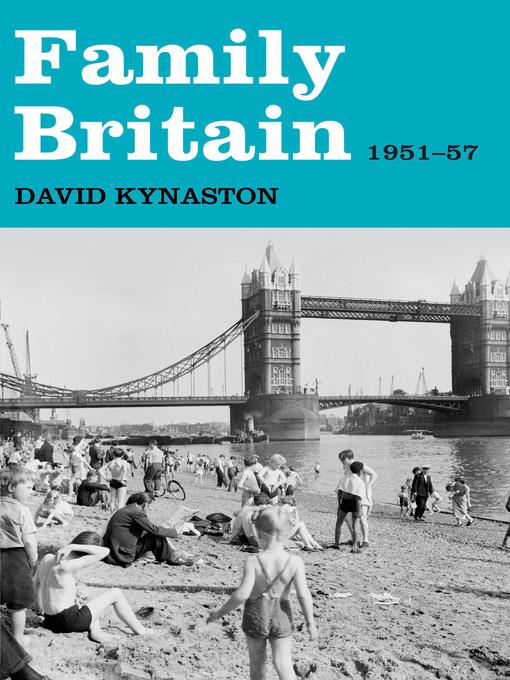
Family Britain, 1951-1957
- اطلاعات
- نقد و بررسی
- دیدگاه کاربران
نقد و بررسی

Starred review from November 16, 2009
Following U.K. bestseller Austerity Britain 1945–1951
, this is the second title in historian Kynaston’s series on postwar Britain. It was an eventful time. A BBC survey conducted after King George VI’s death in 1952 found the lower classes were upset that news of his death disrupted their favorite radio programs. The media was saturated with news of Elizabeth II’s coronation as well as Princess Margaret’s affair with a divorced man. The new Tory Home Secretary gave prosecuting homosexuals the highest priority; the end of meat and butter rationing in 1954 after 14 years caused jubilation; there was a 1955 national rail strike; and Ruth Ellis swung from the gallows for murdering her cheating, abusive socialite lover. Kynaston makes excellent use of personal diaries from housewives, civil servants, and the famous, all struggling with personal lives as they voice opinions on issues of the day (priceless letters by novelist Kingsley Amis show him knocking Dylan Thomas to poet Philip Larkin). As Kynaston juggles a staggering number of sources, he gives us an audaciously intimate, rich, and atmospheric history that is so real, you can just about taste it. Photos.

October 15, 2009
The next chapter—following Austerity Britain, 1945–1951 (2008)—in a staggeringly thorough, ongoing study of postwar Britain.
For most American readers, who don't know Harringay from Herfordshire or Atlee from Eden, this dense sociological study of British society in the 1950s may strike far from the radar. British historian Kynaston depicts lingering postwar rationing, economical buying habits, jobs and educational opportunities, favorite radio shows and football teams, pub-crawling proclivities, birth-control methods, housing inclinations and voting records, among numberless other subjects. The author has a felicitous, fluid writing style, and he nicely dilutes the heavy factual information with the voices of the people, recorded here in diaries, newspaper accounts, etc. From being badly battered by the war to moving into"some sort of peacetime normality" and even gingerly embracing the modern era, the exhausted yet still upbeat British people had voted the Labour party narrowly out of office in 1951 and brought Churchill back in. Underscoring the general mood, one elderly voter is quoted as saying,"All I want is to see England on her feet again." The coronation of Elizabeth in 1953 proved the high mark of the decade, while her sister Margaret's affair with a married officer caused the decade's major scandal. In a country where there was a general aversion to the"common," the working class began to find its voice, aided by depictions on the new medium of television. Kynaston gets at the strong sense of community that was developing among the people, and he covers most of the cultural milestones, including the publication of Dylan Thomas and Kingsley Amis, the hanging of Ruth Ellis, the emergence of the Teddy Boys and the debates over grammar-school reform and modern architecture.
Captures the stolid, charmingly evolving open spirit of the British people—though not likely to appeal to a broad American readership.
(COPYRIGHT (2009) KIRKUS REVIEWS/NIELSEN BUSINESS MEDIA, INC. ALL RIGHTS RESERVED.)

December 15, 2009
In the second volume of his series intending to document Britain from 1945 up to the start of the Thatcher era, Kynaston ("Austerity Britain: 194551") offers a careful analysis of the political, social, cultural, and economic climate that defined Britain's postwar world. Beginning with the 1951 Festival of Britain and concluding with the invasion of the Suez Canal, Kynaston demonstrates how change came rapidly in these years, embraced by some of the general population and rejected by others. While the British were rebuilding, using more modern design, taking to commercial television, and discovering Elvis, they were also still under a wartime rationing system and holding on to an old elitism. Kynaston moves the reader deftly through the most prominent concerns of the time by means of diary entries, excerpted Mass Observation surveys, and other primary accounts. Readers will become actively immersed in the time period to an extent not often found in this kind of study. VERDICT With the previous volume, this is sure to be a staple in the British history genre. It will resonate most with serious Anglophiles and with a scholarly audience. With a comprehensive index (not seen), it could serve as an excellent source in all academic library British history collections.Maria C. Bagshaw, Knowledge & Information Resources, Ecolab, Inc.
Copyright 2009 Library Journal, LLC Used with permission.

December 15, 2009
Picking up where the much-lauded Austerity Britain, 19451951 (2008) left off, Kynastons latest presents a panoramic view of a transformative period. The Conservatives were in power, the ration system was ending, unemployment was nil, and the masses were increasingly glued to the tele. Leading us on an immersive tour of headlines and correspondence, diaries and sociological studies, Kynaston narrates moments and motifs both great and small, among them the Festival of Britain, Council housing, the queens coronation, pub culture, Kingsley Amis, smog, labor strikes, skiffle, the colour bar, grammar schools, football, the Suez Crisis, young Mick Jagger, and the BBC. It is a sensitive portrayal, emphasizing the feelings and perceptions of those who were there, but Kynastons is not an uncritical approach; as the author suggests, the decades instinctive retreat to familiar ways, familiar rituals, familiar relations occurred in the context of only very slowly lifting austerity and uncomfortably limited material resources. Robustly researched and engagingly written with a light wit, this selection will leave readers looking forward to future installments on the Macmillan years and beyond.(Reprinted with permission of Booklist, copyright 2009, American Library Association.)




دیدگاه کاربران